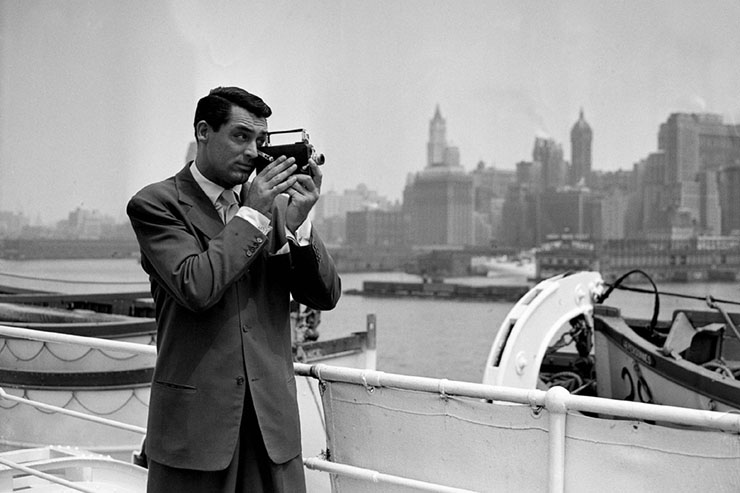When fans of American cinema think of Cary Grant, words like elegance, charm, class, and sophistication come to mind. There can be no question that Grant left an indelible mark on American film and culture. We are drawn to Grant’s performances in screwball comedies and in Hitchcock’s suspense thrillers alike. At the same time, Grant himself was an enigmatic man who was burdened by his past. A new series, Archie (2023), currently streaming on BritBox, explores how Cary Grant became Cary Grant.
Produced by Grant’s daughter, Jennifer Grant, and his ex-wife (and Jennifer’s mother), Dyan Cannon, Archie is a creative and unique biopic told in four episodes. We follow young Grant, whose real name was Archie Leach, through his childhood years in Bristol, England, and the terrible conditions he lived in.
He suffered greatly as a child. First, his mother was put into an insane asylum by his father, who proceeded to tell the young Archie she was dead. (Grant would reunite with his mother, still very much alive, later in his life.) Young Archie was raised by his stern and unloving grandmother because his father had another woman and another son.
To be free of any connection to his neglectful father, young Archie joined a vaudeville group, and while touring America he decided to stay and try his luck in the promised land. It is here Archie changed not only his name but also his accent, ridding himself of Bristol forever. Or so he thought.
Inching slowly toward Hollywood, Grant is met with success, and becomes one of the most sought-after Hollywood stars. As Cary Grant becomes a powerful force, Archie Leach keeps fragmenting Grant’s personality, which causes personal problems. Although Grant was married several times, the series focuses primarily on his marriage to Dyan Cannon, who was 33 years Grant’s junior.
Their marriage lasted only three years (1965-1968) but the union produced a daughter, Jennifer. Grant famously called Jennifer his “best production,” and the series shows how a man who was broken and who demanded control in every aspect of his life, finally reached some semblance of wholeness as a person by becoming a father.
But Archie also shows a darker side of Grant. Here, we see his strange attempts at controlling Dyan: from what she wears and eats, to whether she’s using coasters at the table, and his odd habit of eating lunch and dinner in bed, among other things. This also generally included frantic cleanliness, strict diet requirements, and Grant’s use of LSD in some faddish version of psychoanalysis.
Throughout the years, Grant tried to dig deeply into his subconscious, presumably to rid himself of his anxiety about his past and the lies his father told him, beginning with the faked death of Grant’s mother. But therapy and LSD proved to be useless. It only contributed to the further disappearance of Archie Leach and solidification of the mask that bore the image of “Cary Grant.”
Jason Isaacs plays Cary Grant with perfection and care. Although Grant’s weaknesses are clearly shown, he is never treated as a subject or an object that ought to be exploited for cinematic or ideological purposes. Undoubtedly, his daughter had a firm grasp of the project, but even so, nothing about the series feels rigid or inauthentic.
On the contrary, there is a sense of natural flow as Isaacs’ Grant navigates through many iterations and facets of his personality. For example, Grant’s initial happiness upon learning that his mother is not dead is brief—primarily because his mother turns out to be demanding and possessive, even though she is also trying to love him.
There are no heroes or villains in Archie, and this is what makes the series authentic. Yet, neither is it a lukewarm presentation of Grant or the people who surrounded him. We see depth in Grant as well as in Dyan Cannon (played by Laura Aikman), who is valiantly trying to navigate through an admittedly strange marriage to a much older man. The generation gap is quite clear in many situations, particularly when Grant criticizes Dyan’s “vulgar” clothing, which exudes the spirit of the 1960s—a complete rejection of Grant’s elegance.
When making any kind of biopic, it is easy to slip into one of two exaggerations: the filmmaker can lapse into complete worship of his chosen subject, or he can use the chosen subject to impose some ideological goal and thereby completely pervert reality. Archie manages to avoid both pitfalls. Grant is permitted the dignity he deserves even as the film reveals the depth of his joy, his suffering, and his demanding nature. In other words, Grant is human.
Some subjects are mysteries unto themselves. They wear not only one but many metaphysical masks, so that whatever remains of the original self, it is all long gone and perhaps even forgotten. Grant sought wholeness for most of his life, and especially in his relationships. No matter what he tried to do—be it therapy, LSD, or marriages that inevitably resulted in divorces—there was only one thing that brought Cary Grant true peace, and that was fatherhood.
There is a poignant scene at the end of the last episode of Archie in which Grant addresses the many selves that may have caused him confusion, as well as the demands from the public to reveal himself. None of it matters to Grant, because he is, most importantly, “Jennifer’s father.” It is this act of love rather than any attempts to reach the depths of his consciousness that brought both Archie Leach and Cary Grant peace, however imperfect that peace may have been.

Leave a Reply